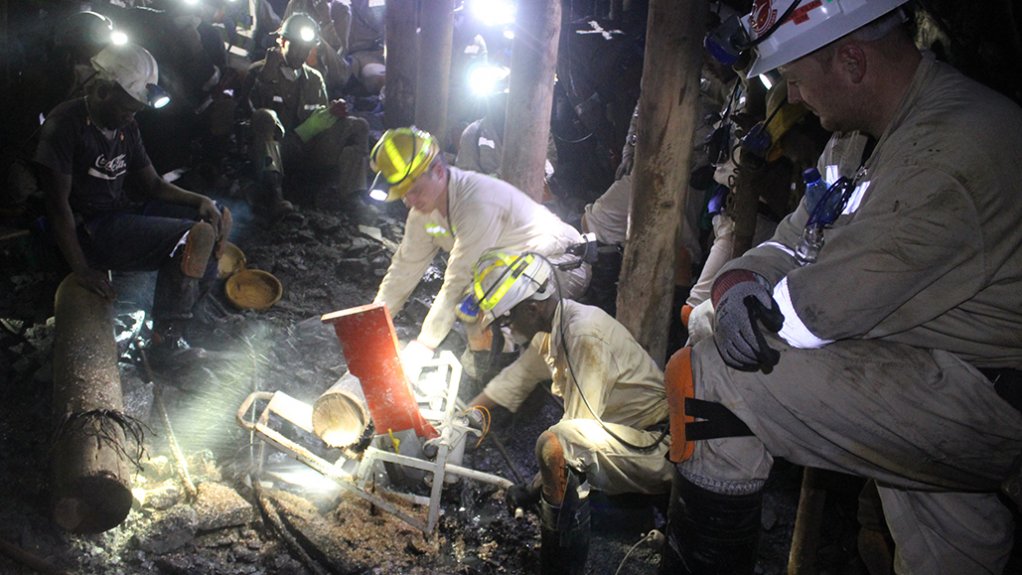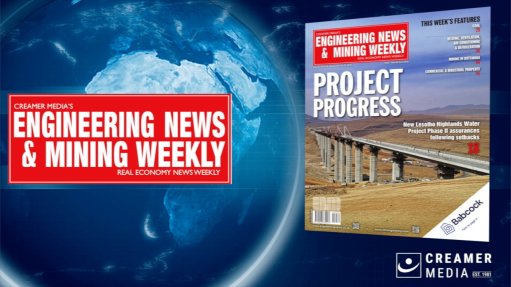Local mines adopting Hydrovessel drilling system


IMPROVING PRODUCTIVITY The HV212 EOD helps mines transition from using conventional compressed air, which is proven to decrease crew efficiencies and, ultimately, threatens the viability of underground mines and the livelihood of local communities
Another two local deep-level mines will completely remove compressed air from their operations over the next 18 months, equipping 120 mining crews with drilling equipment supplier HydroPower Systems’ (HPS’) HV212 EOD Hydrovessel drilling system.
This includes operations in both gold and platinum/chrome sectors, says HPS director Maarten van Jaarsveld.
The HV212 EOD helps mines transition from using conventional compressed air, which is proven to decrease crew efficiencies and, ultimately, threatens the viability of underground mines and the livelihood of local communities.
“The mines’ final decision to convert followed rigorous validation trials, which resulted in a 37% increase in production, and reduced water use by 60% and electricity use by 80%. These projects include the supply and maintenance of complete mining systems, as well as the facilitation of change management to ensure sustainability,” explains Van Jaarsveld.
He says while no challenges were encountered as far as the equipment supply is concerned, challenges regarding the acceptance of new technology is common.
“Proper care must be taken during this process as humans are mostly resistant to change for numerous and very valid reasons of which the most common one is fear of change.”
Therefore, HPS has reconsidered how to approach stakeholders during the changeover process. The company has also reviewed its own organisational behaviour and that of its customers to enable a strategic alliance with a common vision statement where, with simple yet effective planning, the changeover process is executed steadily.
“As the payback on these systems is very lucrative (less than ten months), fast deployment is necessary,” adds Van Jaarsveld.
Change Needed
The HPS drilling system is not only the leading practise in underground mining but has proven to be the only system to achieve production improvement at a lower energy and water volume cost, sustainably, says Van Jaarsveld.
Ever increasing operational costs demand an increase in production which is difficult to achieve, especially with current compressed air systems at maximum capacity. The limitations are also evident in dewatering capacity of these mines, as poor efficiencies increase dewatering volumes on an overburdened dewatering system, which limits the increase required in production.
“The implementation of the HPS drilling system will allow mines to attract investors because of the increased profitability it enables, thus increasing the operating life of mining operations. The result of this will be that communities hosting mining operations and South Africa as a whole, prosper.”
The roll-out of Hydrovessel drilling systems is crucial to the future of the country’s deep-level mines, which face ever increasing operational costs, owing to centralised air and water reticulation systems, emphasises Van Jaarsveld.
Used to transfer energy to mining equipment underground, these systems are a major cause of the significant pressure placed on deep-level mines to increase crew efficiencies, increase life-of-mine and meet production targets.
“But this method has a common flaw – the inability to control efficiency losses by over utilisation, as these systems are rigid in design flows,” elaborates Van Jaarsveld.
The HPS modular system is designed to transfer energy in a controlled manner to each mining crew, allowing for sustained efficiencies and a rapid increase in production.
New Developments
HPS has several exciting new developments in the final stages of production trials.
“Our long-hole drill rig will be used to drill inverts and drop raising, replacing the use of the S36 pneumatic top hammer drillrig used for drilling holes in dropraising applications,” notes Van Jaarsveld.
The drill rig is required to drill long accurate holes without the use of compressed air, which will become redundant in future. The increase in accuracy and penetration rate is an added benefit that will see the low-cost drill rig become a valued addition to compress-airless mines.
HPS is also helping mines digitalise their operations through developing an application-based communication system that will provide management with access to live reporting directly from the HPS modular drilling system. This will not only allow for faster response times to failures, with pin-point accuracy, but also supply the user with various levels of key performance indicators,” Van Jaarsveld tells Mining Weekly.
“We have developed the HPS Application to shorten response times of engineering personnel to conditions that add to lost blasts such as electrical and water supply failures. Being able to see start and end times of mining cycles, down to crew level, and measure energy and water use in real time enables mine supervisors to manage crew efficiencies daily, instead of monthly. The application signals a new era in how we monitor and measure daily production at deep-level mines.”
The long-hole drill rig and the HPS Application have been successfully tested underground with HPS intending to introduce these services to the market in the next six months.
“During the development phase, these systems were tested at various underground mines for four months, in addition to rigorous workshop and laboratory tests. Various global expertise were brought on board to engage in the development of these systems.”
Comments
Press Office
Announcements
What's On
Subscribe to improve your user experience...
Option 1 (equivalent of R125 a month):
Receive a weekly copy of Creamer Media's Engineering News & Mining Weekly magazine
(print copy for those in South Africa and e-magazine for those outside of South Africa)
Receive daily email newsletters
Access to full search results
Access archive of magazine back copies
Access to Projects in Progress
Access to ONE Research Report of your choice in PDF format
Option 2 (equivalent of R375 a month):
All benefits from Option 1
PLUS
Access to Creamer Media's Research Channel Africa for ALL Research Reports, in PDF format, on various industrial and mining sectors
including Electricity; Water; Energy Transition; Hydrogen; Roads, Rail and Ports; Coal; Gold; Platinum; Battery Metals; etc.
Already a subscriber?
Forgotten your password?
Receive weekly copy of Creamer Media's Engineering News & Mining Weekly magazine (print copy for those in South Africa and e-magazine for those outside of South Africa)
➕
Recieve daily email newsletters
➕
Access to full search results
➕
Access archive of magazine back copies
➕
Access to Projects in Progress
➕
Access to ONE Research Report of your choice in PDF format
RESEARCH CHANNEL AFRICA
R4500 (equivalent of R375 a month)
SUBSCRIBEAll benefits from Option 1
➕
Access to Creamer Media's Research Channel Africa for ALL Research Reports on various industrial and mining sectors, in PDF format, including on:
Electricity
➕
Water
➕
Energy Transition
➕
Hydrogen
➕
Roads, Rail and Ports
➕
Coal
➕
Gold
➕
Platinum
➕
Battery Metals
➕
etc.
Receive all benefits from Option 1 or Option 2 delivered to numerous people at your company
➕
Multiple User names and Passwords for simultaneous log-ins
➕
Intranet integration access to all in your organisation

















